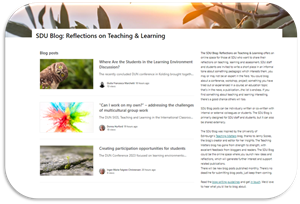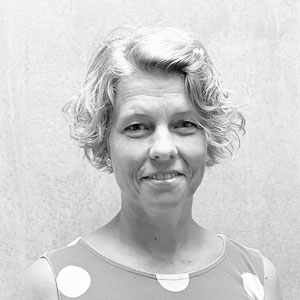
Newsletter June 2023: What is happening in the world of university teaching and learning right now? – experiences and insights from the DUN Conference 2023
At the end of May 2023, the annual DUN conference was held with the participation of 180 teachers, consultants, educational leaders and students from universities and other educational institutions in Denmark and the Nordics. SDU Center for Teaching and Learning was also represented. In this newsletter, we will briefly pass on what we have seen and heard at the conference about what is happening within university and e-learning pedagogy right now.
Briefly about the DUN conference
Every year, Danish Network for Educational Development in Higher Education (DUN) holds a two-day conference for everyone with an interest in university educational questions and answers. Here you can find both paper presentations, workshops, keynotes and posters - from researchers, practitioners, students and consultants. And of course a lot of exchange of experiences about big and small topics during the breaks. This year, the theme of the conference was "Learning Environments: Relationships & Settings, i.e. the physical and psychological study environment, and there was a focus on how to support and facilitate the building and maintenance of good relationships during the time of study - both between lecturers and students, and between students.
Impressions from the conference
Below we have gathered a number of impressions, insights, and input that SDUUP's staff have taken with them from the conference, and which may be of interest to the newsletter's readers:
- Lasse X Jensen (UCPH) presented his research on feedback encounters to explore what characterizes productive feedback. The feedback encounters can be categorized as 1) requested (elicited), 2) formal, or 3) random. Requested feedback encounters are characterised by the fact that the students themselves can control who they want feedback from and what they want feedback on, whereas the formal situations are designed by teachers. The formal encounters are experienced as beyond the students' control and therefore not as fruitful. The random encounters occur when students follow or compare themselves to other people's discussions about academic products and are also experienced as instructive. Firstly, Lasse's research broadens the understanding of feedback activities: Where do we find feedback and how does it have different purposes and conditions? And secondly, it points to how we can organise teaching (and study environment) so that the student has the best opportunities to get more than formal feedback.
- Anne Bang-Larsen from SDU and Tine Wirenfeldt Jensen, external supervisor at SDU’s Lecturer Training Programme, together with colleagues, conducted a workshop on AI in guidance. AI will have an impact on all forms of teaching and examinations, including guidance. For what do we understand by concepts such as originality, writing and plagiarism, and what role does the relational aspect of the guidance play if the student's texts/products and/or supervisor's feedback are produced in whole or in part by artificial intelligence? These are questions that every assignment supervisor should consider: how can I – and my students – make the best use of artificial intelligence, and what dilemmas does its use bring?
We have asked Tine to hold a similar workshop for the participants in this summer's Lecturer Training Programme in August, and we look forward to it!
- The good learning environment can be created through good relationships between teacher and students – e.g. through the involvement of students in research projects (Student as Partners - SaP). But how do you do it concretely? This was the focal point of a workshop held by Sabrina Vitting-Seerup (UCPH). Here she reviewed five considerations prior to organizing a SaP project:
- Does it make sense to co-create? Regarding your topic/methods? Your students? The teachers involved?
- What parts of the scientific process do you want to co-create? At which steps in the scientific process would you like to include the students
- How to practically co-create? Do you need special equipment? Other participants than the students? What about GDPR?
- When and to whom do you need to communicate the process? Keeping everyone in the loop is essential for a successful co-created project, but it takes time and effort.
- Do you want to publish? If you want to publish your research in the end, it is important to make the line of authorships clear for everyone involved and to make a clear co-writing strategy.
More and more employees at universities are working with Students as Partners programmes because, among other things, it strengthens students' experiences of belonging and thus also their commitment to studies and student life. If you would like to know more about SaP, you can either consult the, get a general overview of the research in the field, or contact SDU Centre for Teaching and Learning, sduup@sdu.dk.
SDU is a member of DUN, which means that all employees at SDU have access to DUN's activities (and receive discounts at DUN conferences) - it's just a matter of signing up as a member (press the “BLIV MEDLEM” tap), Next year's DUN conference will be held on 23-24 May 2024, and we will be pleased to see more of our SDU colleagues participate. If you can't wait, there are a lot of exciting activities under the auspices of DUN in the meantime that you can participate in.
Blog posts from the DUN conference
 As a new initiative to pass on insights and input of a university pedagogical nature – e.g. from conferences like this, but also from everyday life – we hereby introduce the SDU Blog: Reflections on Teaching & Learning. The blog offers an online space for staff and students at SDU who want to share their reflections on teaching, learning and assessment.
As a new initiative to pass on insights and input of a university pedagogical nature – e.g. from conferences like this, but also from everyday life – we hereby introduce the SDU Blog: Reflections on Teaching & Learning. The blog offers an online space for staff and students at SDU who want to share their reflections on teaching, learning and assessment.
